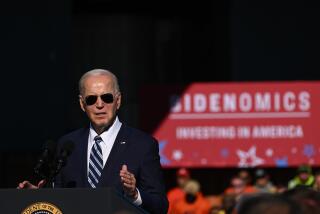Obama holds ‘significant lead’ over Romney in new national poll
- Share via
With the election still four months away, President Obama holds “a significant lead” over Republican challenger Mitt Romney, according to a new Pew Research Center poll released Thursday.
The national survey, completed July 9, showed Obama outpacing Romney by 50 percent to 43 percent. That’s a more substantial gap than most recent surveys have registered, but Obama has held at least a small lead in earlier polling by Pew. The independent polling operation said there had been “no clear trend in either candidate’s support” since Romney secured the GOP nomination in early spring.
When it comes to fixing the economy—the top issue of the campaign--“Romney has not seized the advantage,” Pew’s analysis concluded. “In fact, he has lost ground on this issue over the past month.”
Of potentially greater significance than the overall national figures, Obama continues to lead Romney in battleground states. In the 12 states considered most competitive at this point, the president holds a seven percentage-point edge, 51 to 44, the Pew survey found. A Wall Street Journal survey, released late last month, also showed Obama with an eight-point advantage in battleground states.
The national figures found no overall improvement in Romney’s standing with voters over the past two months, a period in which Obama has attempted to keep his rival on the defensive with negative ad attacks on his business record and personal wealth. Some Republicans outside the Romney camp have become increasingly jittery about what they regard as insufficient progress by their party’s unofficial nominee against a vulnerable incumbent.
As the campaign heads into mid-summer, a period in which public attention will be diverted, at least in part, by the Olympic games in London, Romney has failed thus far to capitalize on deep voter dissatisfaction with the way things are going in the country.
At the same time, Obama’s job-approval rating has ticked up slightly. In the latest poll, it stood at 50 percent, the first time Pew found that he had reached positive territory on that score since March.
Voters were asked which candidate was best suited to fix the U.S. economy, and by a six-point margin they favored Obama over Romney, 48 percent to 42 percent. That’s a sharp turnaround from June, when Romney held the advantage on that question by eight points, 49 percent to 41 percent.
A similar shift was reflected among independent voters, a prized target for both candidates, who are now almost evenly divided on who would best improve the economy. In June, Romney enjoyed a 13-point edge among independents on that question.
The latest survey, like most polling at this stage of the campaign, did not attempt to narrow the contest down to likely voters. Obama’s lead, Pew found, stemmed from the fact that more voters currently identify themselves as Democrats than Republicans, and that virtually identical proportions of each say they will back their party’s nominee.
Put another way, the results of the survey are yet a further indication that voter mobilization will be crucial in determining the winner of this year’s election.
Obama has increased his lead among younger voters—historically the least likely to turn out on Election Day. It’s now 24 percentage points, down from 34 points in the 2008 election. Independent voters—who typically decide close elections—remain split, with 46% favoring Romney and 45% supporting Obama, a statistical tie.
Romney has a “particularly strong” advantage among working-class whites, the poll found. White voters with less than a college degree favored him by 58 percent to 38 percent over the president. College-educated whites, meantime, were split (50% Obama, 47% Romney).
Obama, attacked by Romney as “weak” on foreign policy, held a solid advantage over the former Massachusetts governor when voters were asked which candidate would do the best job of defending America from terrorist attacks and making wise foreign policy decisions.
Romney’s only issue advantage came on the question of who would do the best job of reducing the federal budget deficit. However, that issue trailed jobs and healthcare when voters were asked what mattered most to them in deciding their vote for president this year.
Follow Politics Now on Twitter
Twitter: @paulwestdc
More to Read
Get the L.A. Times Politics newsletter
Deeply reported insights into legislation, politics and policy from Sacramento, Washington and beyond. In your inbox three times per week.
You may occasionally receive promotional content from the Los Angeles Times.










